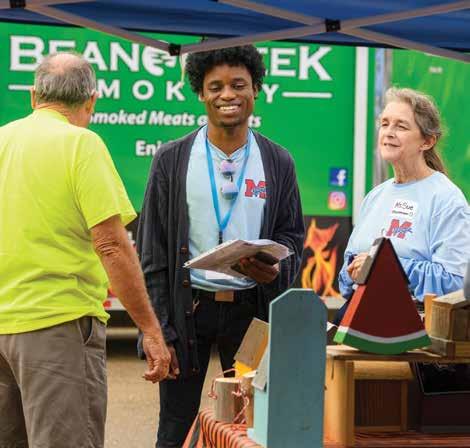
10 minute read
Entrepreneurship Forum lays foundation for partnerships to boost state’s economy
Planting Seeds through Service McLean staff assesses student civic learning through community partnerships
Aqualitative research study examined the effect of service-learning on strengthening community-university partnerships. Laura Martin, associate director of the University of Mississippi’s McLean Institute, and Albert Nylander, director of the institute, conducted the study.
Advertisement
Working with former CEED innovation scholar Janae Owens, Martin and Nylander presented findings from their study of civic learning outcomes among students participating in a yearlong co-curricular service project housed at the McLean Institute.
“The expectation is that civic action on the part of the students will support the co-creation of knowledge and facilitate control on the community’s end,” Martin said. “The community, in turn, will support community development and action projects they help create through the student engagement program.” The mission of the McLean Institute is to advance transformative service throughout the university and fight poverty through education in Mississippi. Guided by this mission, the McLean Institute works to institutionalize community engagement practices in a way that affects quality of life in partner communities. The Student Engagement Fellows program emerged out of a desire to nurture partnerships among student groups and communitybased organizations. Fellows participated in a competitive application process, received a $2,000 scholarship for the academic year and a $500 project budget, and were expected to work collaboratively in order to involve student organizations in community programming and to tailor their projects to community needs. The institute provided assigned readings, led discussions and facilitated project planning.
The institute and a community partner located in the Mississippi Delta first sought collaboration in January 2015. The community is a town of
M Partner community day in Charleston.
– Laura Martin
around 1,200 people, 98 percent of whom identify as African American, with 500 housing units occupying nearly four-ten ths of a square mile. Median household income is about $18,000; half of the population lives below the poverty level, and over 60 percent of children live below the poverty level.
“In this community, exposure to college students can present possibilities for future educational pursuits that youth may not otherwise observe in their community,” Owens said.
In approaching the community, student engagement fellows acknowledged members as the authorities on how to identify and respond to community challenges. Programming for each year was developed collaboratively with community members and sought to address a lack of enrichment opportunities for youth in this rural Delta community.
Based on those meetings, student engagement fellows organized a series of events such as a youth nutrition workshop, a composting and recycling workshop, garden and greenhouse workdays, a community health fair, ACT preparation sessions, a financial literacy and resume building workshop, and a young women’s empowerment workshop.
Fellows identified a common theme for their workshops, which was “Planting Seeds through Service.” The study conducted by Martin, Nylander and Owens was grounded in a conceptual understanding of community engagement and its communityuniversity partnerships serving on the forefront of social change through co-curricular service learning in higher education.
“Long-term engagement from both community partners and university students with high levels of passion for what they are doing is highly effective for transforming communities struggling to provide opportunities for their most vulnerable members,” Martin said.
“We argue that the student engagement fellows’ civic learning and resulting transformation in perspective occurred during their yearlong community practice, developing the critical lens necessary to see the structural issues of social justice

and challenging their own system of assumptions about reality.”
Using an ethnographic sensibility to illuminate the process by which the student engagement fellows made meaning out of their experiences, the study examined student civic learning — probing the development of critical thinking around identity, systemic injustice and one’s own set of assumptions about reality — to draw insights into how that learning can strengthen partnerships with community-based organizations.
Student engagement fellows completed three written reflections, participated in a key informant interview and took part in a focus group at the end of the academic year. Participant observation and field notes, as well as surveys of UM students and community participants, provided additional data. A community partner interview provided an external perspective on the program.
“Participants in the Student Engagement Fellows program demonstrated civic learning and reflection around a motivation to learn and lead, the opportunity to develop sustainable models of community involvement, examination of self in connection with others, and the sense that community-based learning can be a site of personal and systemic transformation,” Nylander said.
“Moving beyond individual civic growth and development, the impact of co-curricular servicelearning programs such as Student Engagement Fellows can reverberate throughout a campus and partner communities by engaging students, faculty and community members to collaboratively create solutions to community problems,” Martin said. n
Student volunteers from the University of Mississippi spend a day in October working in New Albany during an M Partner event.
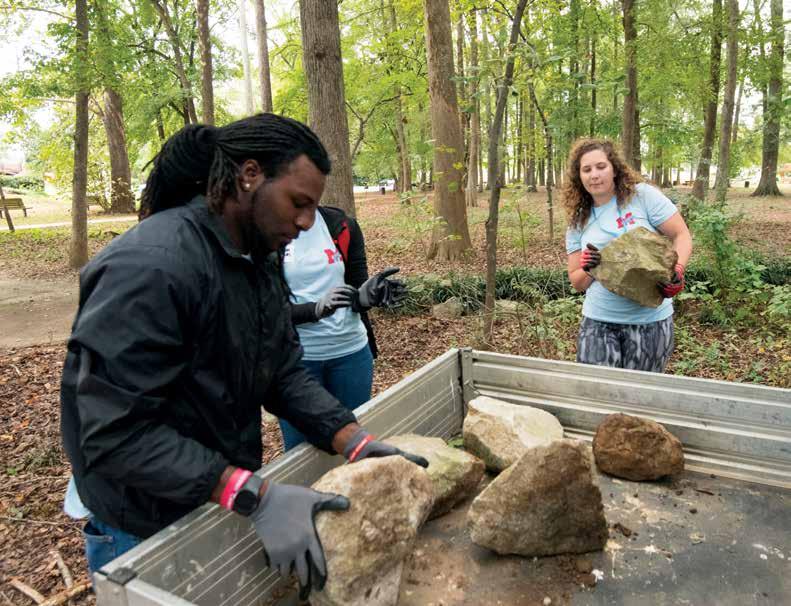
University of Mississippi celebrates M Partner pilot year and sets ambitious goals Community, university partners build momentum to advance projects across state
With over a dozen ongoing communityengaged courses and co-curricular projects, University of Mississippi faculty, staff, students and community partners are leading a groundbreaking spring semester. The pilot phase of M Partner will address priority projects centered around community health and well-being, economic development, educational initiatives, and beautification; all of these projects have the potential to create partnerships that lead to transformational collaborations between community members and UM faculty, staff and students.
“M Partner gives our students and faculty ways to engage in meaningful relationships and partnerships with the communities and citizens of Mississippi,” said Noel E. Wilkin, provost and executive vice chancellor for academic affairs. “These collaborations and experiences make the work we do relevant to the state and have a transformative effect on our faculty and students, while striving to improve the quality of life for those in the communities.”
M Partner was designed after a national model, the Educational Partnerships for Innovation in
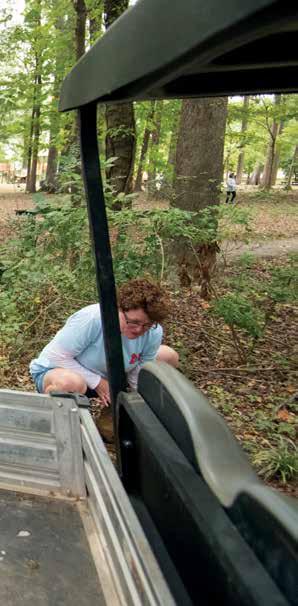
Communities Network, or EPIC-N. This initiative offers a framework through which community and university representatives can cultivate mutually beneficial partnerships that will lead to the co-creation of knowledge and ideas to enhance community wellbeing. The university and the partner communities have committed to a pilot phase of 18 to 24 months in the partner communities of Charleston, Lexington and New Albany.
After the launch in March 2018, M Partner convened stakeholder meetings with community leaders in Charleston, Lexington and New Albany to identify each community’s strengths, opportunities and aspirations. “In the needs assessment phase of M Partner, we spoke with many individuals who are working tirelessly to create pathways to opportunity and economic mobility,” said Albert Nylander, professor of sociology and director of the university’s McLean Institute for Public Service and Community Engagement.
“Across all partner communities, we heard a deep desire for economic growth and an aspiration for the younger generation to be part of a movement toward innovation and economic revitalization.”
These community meetings produced a list of 27 priority projects, and structured how the university as a whole can advance community and economic development in these three rural Mississippi communities.
During the spring 2019 semester, faculty and staff have taken on 15 of the community-identified projects. These priority projects will address community interests such as social media campaigns, health fairs, the opioid epidemic, grant writing,
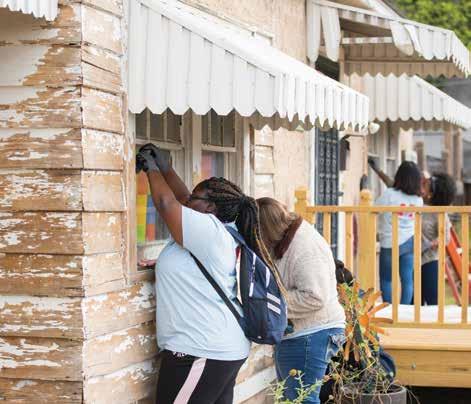
research around the third-grade reading gate, expanding local farmers markets, and analysis of parks and recreation infrastructure.
“In the first year of M Partner implementation, we sought to generate momentum by aligning with other initiatives housed at the McLean Institute,” said Laura Martin, M Partner director and associate director of the McLean Institute. “Through the efforts of summer associates with the North Mississippi VISTA Project and students in the Catalyzing Entrepreneurship and Economic Development initiative, M Partner offered summer learning and enrichment opportunities for nearly 400 youth in Charleston, Lexington and New Albany.”
The M Partner pilot phase will last until June 2020. For the duration of the pilot phase, M Partner will continue to establish and deepen collaborations with community partners to advance the shared goal of co-creating knowledge and resources to promote community well-being. n
M Partner Spotlight
Jarvis Benson
Hometown: Grenada, Mississippi Degree Program: International Studies and Spanish
What have you enjoyed most about volunteering with M Partner initiatives? I really enjoy the impact that we as volunteers are able to make. Instead of going in and leaving within a day, we are able to really get to know the community and serve according to their needs. I loved the work I was able to do because I was able to connect to a community very similar to my own. I was able to meet and interact with community members, students and parents. I feel that I quickly formed relationships with students in the program and looked forward to listening and learning about their lives every day.
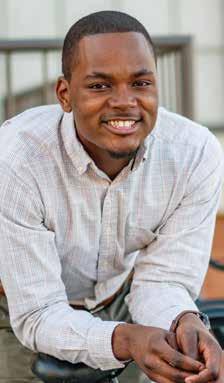
What have you learned serving in M Partner communities? I have learned that the wisdom that these communities can offer is so useful. Also, I have learned that every community is different and special in its own way. Additionally, I learned from this community about the importance of connection. The individuals I met and worked with during my time as a volunteer taught me that by building connections with people in the community, I will be able to learn about the community on a deeper level.
Michaela Cooper
Hometown: Mantachie, Mississippi Degree Program: Dietetics and Nutrition, Pre-Physical Therapy at the University of Mississippi; recently accepted to Harding University Physical Therapy Program
What do you enjoy most about your work with M Partner and the North Mississippi VISTA Project?
I am constantly surrounded by the greatest minds and supports that I could ever ask for. In my year after graduating and starting my next chapter into PT school, I wanted the chance to serve the state that had educated and supported me and needed my help in supporting others who did not have the same opportunities I had. I was connected with the NMVP and later M Partner, and it is through my work that every day I get to see the catalyzing effect of what a few people — with a heart for community engagement and the knowledge of sustainable practices — are able to accomplish in this beautiful state. It is easy for someone to have a bird’seye view and see the pitfall statistics our state is notoriously falling in, but I have the privilege to be a part of an organization that is shifting the dialogue on these systemic problems. We are not standing idly by; we are rolling along.
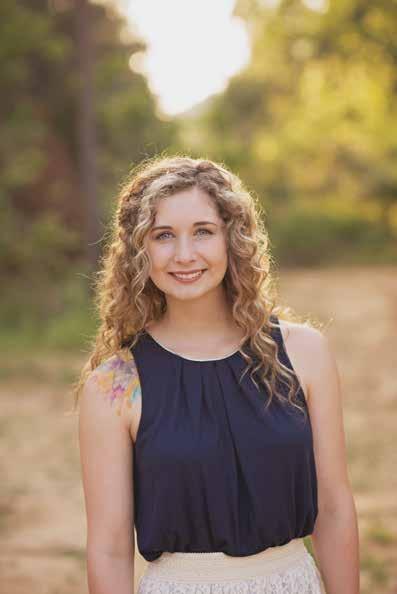
What have you learned as a VISTA member serving M Partner communities? No book could ever have prepared me for what I have learned as a VISTA. Life before VISTA, I saw communities like the three I serve and just wanted to pour my whole heart into. I was the hero. However, I have learned that I am no expert when it comes to these communities. I am an outsider learning about not only the sinkhole of poverty surrounding their town but also the assets that truly keep them running. I have learned to assess a community through the lens of “asset-based community development” and what it means to do so sustainably. It is so easy to step in and one person provide anti-poverty related services, but is your work really elevating the community if after you leave no one is able to continue? Community engagement work is often transactional — days of service, curriculum, marketing materials — but it is important to develop these transactions in such a way that they create a transformational community in the years after your service. n










